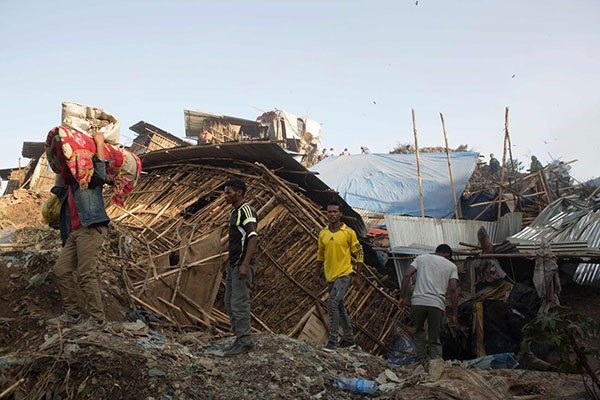
Tuesday March 14, 2017

People move their belongings after dwellings built near the main landfill of Addis Ababa on the outskirts of the city were damaged in a landslide on march 12, 2017. PHOTO | ZACHARIAS ABUBEKER | AFP.
At least 65 people were killed in a giant landslide at Ethiopia's largest rubbish dump this weekend, officials said Monday, in a tragedy that saw entire families including children buried alive.
Police and firefighters combing a "vast area" at the dump outside Addis Ababa found bodies throughout the day, Lencho told AFP.
The disaster on Saturday at the dump flattened dozens of homes of people living in the Koshe dump when part of the largest pile of rubbish collapsed.
LARGEST LANDFILL
"The number of dead has reached 65," said Dagmawit Moges, head of the city communications bureau.
Many of the victims were squatters who scavenged for a living in the 30-hectare dump.
"Those at the top (of the dump) were taken by this pile, because it split and people could not make (their) way out of this debris," Lencho said, adding that most of the dead recovered are women and children.
The landfill is the country's largest and home to perhaps hundreds of people who collected recyclables that were trucked in from neighbourhoods around the city of around four million.
The government tried last year to close the dump and shift it to a new location, but opposition from residents at the new site scuttled the plan.
Residents who spoke to AFP blamed a biogas plant being constructed on top of the rubbish for causing the collapse.
They said work by bulldozers to flatten the area around the plant contributed to the collapse.
Lencho said the cause was still being investigated, but denied that the plant's construction had anything to do with the collapse.
He blamed the squatters for digging into the hillside, destabilising it and causing it to fall.
All the shacks built on the landfill would be demolished and the residents resettled elsewhere, he said.
HUNDREDS OF SQUATTERS
But Amnesty International said the government was to "fully responsible" for the disaster. "It was aware that the landfill was full to capacity but continued to use it regardless.
It also let hundreds of people continue to live in close proximity to it," the group's Muthoni Wanyeki said in a statement.
"These people, including many women and children, had no option but to live and work in such a hazardous environment because of the government's failure to protect their right to adequate housing, and decent work."
Ibrahim Mohammed, a day labourer living at the landfill whose house was narrowly spared destruction, on Sunday said the disaster happened in "three minutes".
He estimated that more than 300 people live on the landfill.
For more than 40 years the Koshe site has been the main garbage dump for Addis Ababa, a rapidly growing city of some four million people.
People had built the houses about two to three years ago, said Berhanu Degefe, a rubbish collector who lives at the dump but whose home was not destroyed.
POVERTY
"Their livelihood depends on the trash. They collect from here and they live here," Degefe said, referring to the victims and other squatters.
"This part, all of it went down," he said, gesturing at a huge chunk of the hill that suddenly slid.
Degefe said they were levelling ground for the plant, increasing pressure on the hillside and causing the collapse.
Koshe, whose name means "dirt" in local slang, was closed last year by city authorities who asked people to move to a new dump site outside Addis Ababa.
But the community there did not want the landfill, and so the garbage collectors moved back.
Poverty and food insecurity are sensitive issues in Ethiopia, which was hit by a famine in 1984-85 after extreme drought.
In recent years, the country has been one of Africa's top-performing economies and a magnet for foreign investment, with growth in near-double digits and huge infrastructure investment.
Still, nearly 20 million Ethiopians live below the poverty line set by the World Bank.
Critics have hit out at the government's economic policies saying they have a limited trickle-down effect from the elite down to the majority of the people.